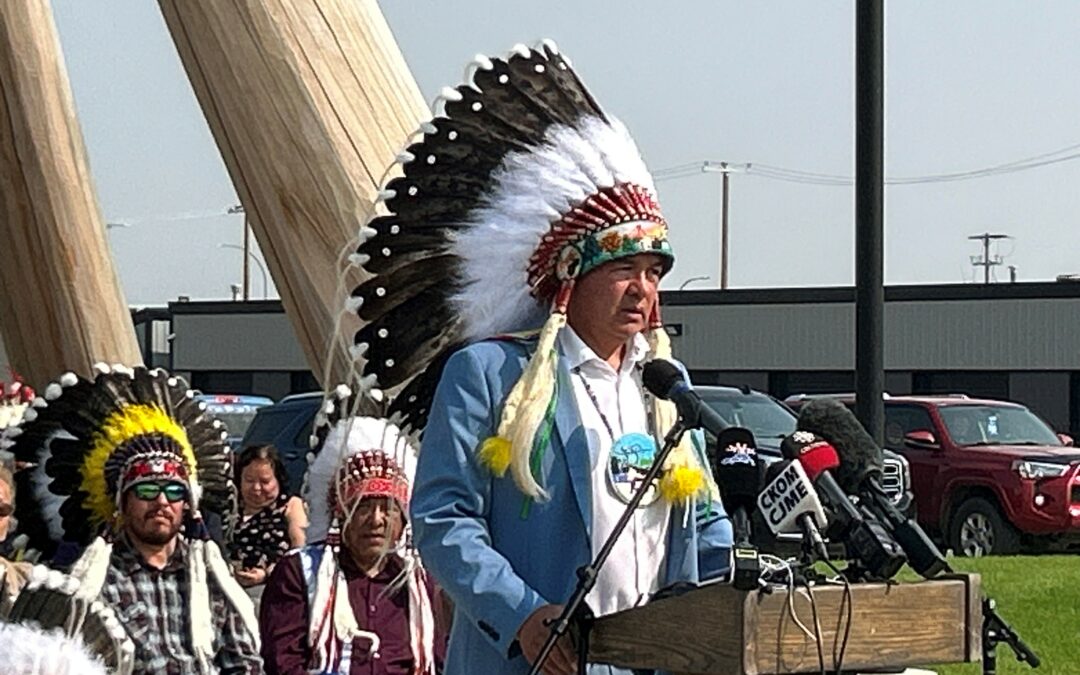A legal battle is on the horizon, as Saskatchewan Indigenous leaders are signaling a court challenge to the Natural Resources Transfer Agreement of 1930 (NRTA) and provincial legislation the Saskatchewan First Act.
Chiefs, Tribal Council leaders and the Federation of Sovereign Indigenous Nations today, stated they are willing to fight over a fair resource revenue sharing agreement and increased consultation over resource extraction.
“This is the biggest Treaty battle in the history of our Treaty territories here and now,” said Federation of Sovereign Indigenous Nations Chief Bobby Cameron. “They failed in their duty to consult. It was an illegal, unlawful document in 1930. And it still is today, that NRTA agreement. It is still illegal, it is still unlawful.”
A court challenge to the Sask. First Act was heavily considered since the legislation was passed in March. Indigenous leaders at that time were denied from speaking to lawmakers while the Bill was being debated in committee.
The province has long-maintained that the legislation does not infringe on Treaty Rights, but exercises its jurisdictional authority over natural resource development in Saskatchewan.
While the FSIN has broad support for court intervention, not all First Nations are on board.
“There’s a better way to do this. Our leaders have lost the ability to negotiate, and that is what Shoal Lake is doing right now,” explained Marcel Head, Chief of the Shoal Lake Cree Nation. “We have a process with the federal government and the provincial government to start that process.”
A legal challenge could cause an uncertain climate within the mining industry, making Saskatchewan less attractive.
Cameron told investors this legal battle could take a longtime to resolve, unless a resource revenue sharing agreement is negotiated.
“To all those investors that you think are going to come to Saskatchewan and invest in resource development, don’t come here, because there is a battle brewing and its going to take a longtime,” Cameron said. “Unless the federal and provincial governments reach out and say we can do better.”
Two weeks ago Minister Responsible for First Nations and Metis Relations Don McMorris released an updated draft consultation policy framework, which is widely denounced by First Nations leaders.
FSIN Vice-Chief Heather Bear said this policy is worse than the previous, suggesting the revisions made only benefit the government and its Sask. Party voters. She asserts the province has decreased the amount of Crown land the government must consult on, while increasing the amount of land they do not have to consult on.
The FSIN rejected the new consultation policy framework. “The province has a bad record when it comes to consultation with First Nations – whether it’s crown land sales, legislation that impacts our Nations, or resource development within our Treaty and traditional territories, the lack of consultation is disturbing,” Cameron. “This is why our Nations don’t want to contribute to revising the province’s already deeply flawed consultation policy. We reject their Consultation Policy Framework, and such framework does not apply to our Treaty Nations. Treaty rights trump provincial laws.”
(With files from Michael Joel-Hanson. Photo credit to Michael Joel-Hanson.)
